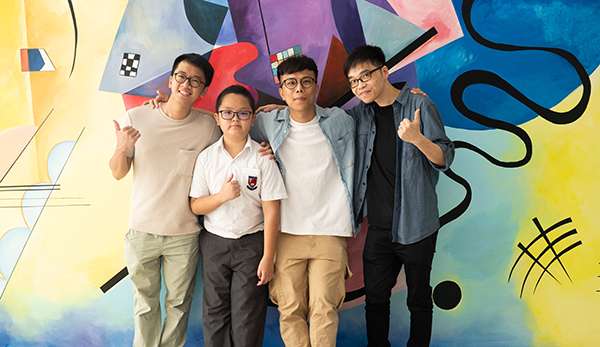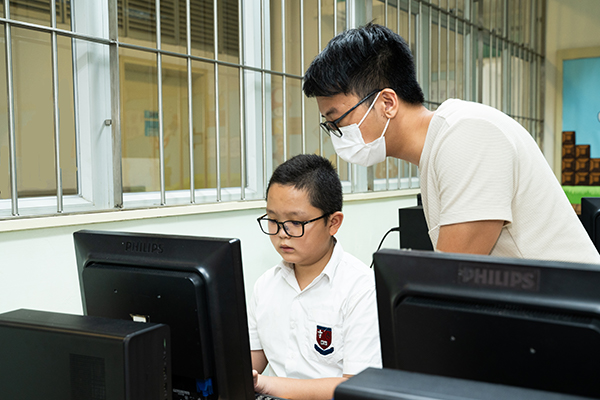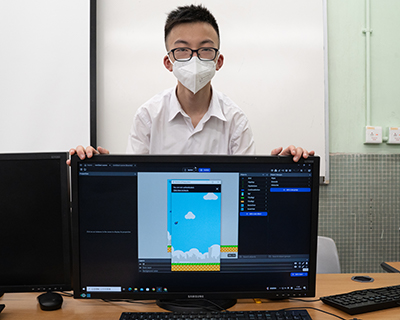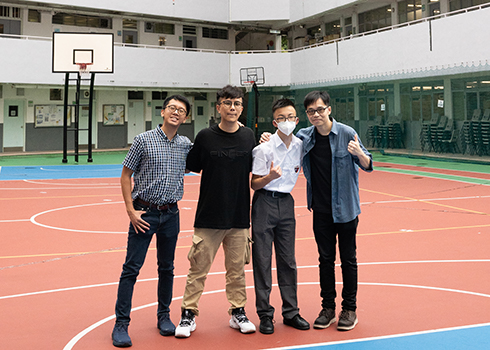CS Service:Teen TechCreator
Empowering Teens' Digital Intelligence to Explore Gaming Careers
'IQ' (Intelligence Quotient) and 'EQ' (Emotional Intelligence Quotient) are familiar terms to you and me, but do you know what 'DQ' means other than 'disqualified'?
The answer is 'Digital Intelligence Quotient'. In 2017, a think tank organisation proposed '#DQEveryChild' at the World Economic Forum, promoting the development of digital intelligence in new generations to embrace the opportunities and challenges of the digital age. In January this year, we received funding from the Community Chest's Social Innovation Fund to launch the 'Teen TechCreator' project. The project aims to develop young people's digital intelligence. It also gives them another career development path - gaming.

Gaming becomes a motivation for learning
Joe TANG, Centre-In-Charge of 'Online New Page - Online Addiction Counselling Centre', who leads the project, said that 'Teen TechCreator' originated from a hidden youth case he was following up on. This young person was unmotivated about everything except being interested in online games. Joe discovered that many young people were learning game designing out of their interest in gaming. 'So, I started a group at the centre where volunteers taught young people how to design games. The feedback has been very positive. Many young people regained their motivation to learn.' Joe said, 'Then I thought, why not promote this model to other secondary school students?'
That is how 'Teen TechCreator' was born. The project currently works with seven secondary schools from different districts in Hong Kong, with over 60 secondary students participating. It divides into two phases, each consisting of four stages. Students learn to create various online games and coding skills in each phase. At the same time, the project provides career and life development counselling. The ultimate goal of each phase is to organise an exhibition to showcase the online games made by the students that address social needs. 'Students can find their interest or even career path in coding,' said Kelvin NGAI, the project's Welfare Worker, 'even if they discover that coding is not their path, online games also involve multiple elements such as graphic design, character design, screenwriting, and so on.' Joe added that it's not true that everyone who likes to play games wants to make games, but it is still essential to help young people understand this earlier and choose other suitable development paths.

Helping teenagers discover their gaming dreams
'The project allowed me to find my dream and taught me knowledge about game production,' said YEUNG Chun Tong, a secondary one student at Ma Kam Ming Charitable Foundation Ma Chan Duen Hey Memorial College. 'I will attend the project's next stage to gain more knowledge and make games of my own'. For Chun Tong, who doesn't have a computer at home, making games seems out of reach. He also admitted that he was behind in his learning and had to ask the tutors for help. 'I saw him learning to make games in every class. Sometimes he fell behind, but he always remained enthusiastic and persevered,' said Jason KWAN, the project's Social Work Assistant. He praised Chun Tong for being very focused in class and told him, 'I think you have potential. Keep it up!'
During the interview, Chun Tong initially seemed a little nervous and shy. But when the conversation shifted, and he was asked to demonstrate the games he had created, he immediately became energetic. Without hesitation, he turned on the computer and skilfully used the game production software. In the first stage, the students had to create two games. The first was a 2D shooter game about fighting monsters. The second was a flappy bird game about dodging obstacles. Chun Tong said that making games, like playing games, involved a 'sense of failure' during the process. He may encounter various problems or bugs, but persistent exploration would eventually lead to a 'sense of accomplishment'.
Another participant, Andy LAI, is a secondary three student at Caritas Fanling Chan Chun Ha Secondary School who hopes to become a 'game designer'. 'I want to create a strategy game like Romance of the Three Kingdoms,' said Andy, who has a deep interest in Chinese and Japanese Warring States history. 'I know it will be challenging, but I want to try.' He said openly that, compared to traditional learning methods, learning about various characters and backgrounds from different eras by playing history games and discussing them with friends has sparked his interest and motivation to study.
What does it take to become an excellent game designer? Andy said that first, you need good English skills to understand the relevant knowledge thoroughly. Andy may have the motivation to study a subject other than history.

Connecting different partners to promote gaming education
Jason and Kelvin, who run the project, have no IT or game production background. A collaborative partnership is, therefore, crucial to the project. Principal Stanley KAM, Vice-Chairperson of the Hong Kong Association for Computer Education helped to recruit schools to join the project. Dr Ray CHEUNG, Associate Professor from the Department of Electrical Engineering at the City University of Hong Kong, provided professional advice and helped to recruit undergraduate students to be tutors. Mr CHEUNG Sun On designed the curriculum for the project. The social enterprise 'Dream Impact' linked the project with various enterprises to teach students about social innovation and design thinking.
Where there are people, there are also disagreements. Jason said they had different opinions when they first designed the curriculum. But the most important thing is that everyone is working towards the same goal of enabling the students to grow. They also had to take into account the interests and abilities of the students and put themselves in the shoes of today's students. 'Each school has a different style, and each student is independent,' said Jason. 'We can't expect one textbook to work for everyone. We will adapt the course content to the different situations and needs of the students.' After overcoming one difficulty after another, the project's first stage has been completed smoothly, and the second stage is expected to start after the summer holidays.
Although the project aims to organise a games exhibition, Joe hopes that in the long term, 'Teen TechCreator' will become a successful model and a curriculum package to be adopted by schools across Hong Kong, benefiting more young people.









